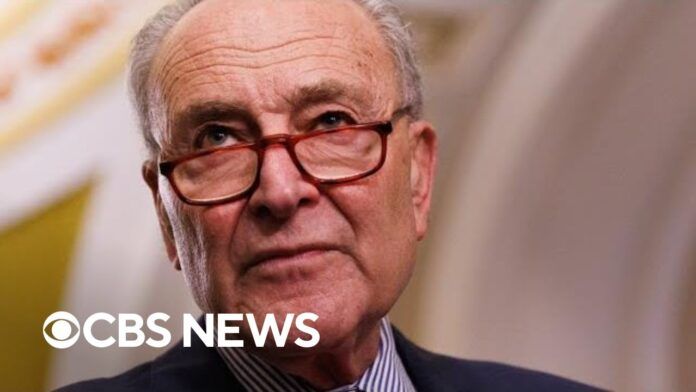Senate Majority Leader Chuck Schumer calls for new leadership in Israel, marking a significant shift in U.S. sentiment towards Prime Minister Benjamin Netanyahu
In a remarkable development that signifies a turning point in the long-standing alliance between the United States and Israel, Senate Majority Leader Chuck Schumer has publicly called for Israel to conduct a new election to potentially replace Prime Minister Benjamin Netanyahu. This move, articulated through a series of speeches and statements, underscores a growing rift between U.S. political leadership and Netanyahu’s administration, particularly concerning Israel’s strategic direction and its handling of the conflict in Gaza. Schumer, the highest-ranking Jewish official in the U.S. government and a traditionally staunch ally of Israel, expressed profound concern over Netanyahu’s leadership approach, which he believes has deviated from Israel’s best interests and risked turning the country into an international pariah. This call from Schumer about conducting the new election in Israel publicly has not only restructured the perception of US-Israel but has also proven to be an insiders’ critique which has given this speech a lot of credibility and legitimacy.
Washington Post
The Washington Post provides a detailed account of Schumer’s criticism towards Netanyahu, encapsulating the Senate Majority Leader’s disillusionment with Israel’s current direction under Netanyahu’s helm. Schumer, in his impassioned speeches, emphasized the urgent need for a new election in Israel, framing it as a pivotal moment for the country to reassess its leadership in the wake of escalating tensions with Gaza and the broader international community. He argues that Netanyahu has prioritized political survival over the national interest, endangering Israel’s diplomatic standing and its future.
Schumer’s call for change comes at a critical juncture, with Netanyahu facing widespread domestic unpopularity, coupled with international criticism over his management of the Gaza war and his reluctance to pursue a two-state solution with the Palestinians. These factors, according to Schumer, have compromised Israel’s moral and strategic position, necessitating a fresh electoral mandate to redefine the country’s path forward. Schumer’s statements, as reported by the Post, reflect a deep-seated concern for Israel’s wellbeing, urging a recalibration of its governance to align with democratic principles and international norms.
BBC
The BBC’s coverage on the issue further illuminates the international dimensions of Schumer’s critique, highlighting the broader concerns over Netanyahu’s policies and their implications for Israel’s global standing. Schumer’s pronouncements, as covered by the BBC, resonate with a growing disillusionment among Israel’s allies regarding Netanyahu’s approach to the Palestinian conflict and his dismissive stance towards international diplomatic efforts aimed at peace and stability.
The report underscores the significance of Schumer’s intervention, noting the rarity of such a direct call for leadership change from a senior U.S. official. It portrays a deepening rift not only between Israel and the United States but also within the broader international community, concerned about the potential for prolonged conflict and further destabilization in the region. The BBC article situates Schumer’s call within the context of increasing political pressures facing Biden’s administration, reflecting a shift in U.S. domestic and foreign policy discourse around Israel and the Middle East.
AXIOS
AXIOS delves into the immediate repercussions of Schumer’s speech within the political spheres of both the United States and Israel, characterizing it as a seismic event that has stunned officials and observers alike. The publication highlights the gravity of Schumer’s critique, given his longstanding support for Israel and his close political ties with Netanyahu. This unexpected stance from Schumer, as AXIOS notes, has opened the door for other Democratic lawmakers to express their own concerns about the Israeli government’s direction, marking a potential shift in U.S. policy orientation towards Israel.
The article also explores the strategic calculations behind Schumer’s public denouncement, suggesting it reflects a broader change in sentiment among the American and Jewish American communities towards Netanyahu’s administration. By challenging Netanyahu’s leadership, Schumer is signalling a pressing need for a reevaluation of U.S.-Israel relations, emphasizing the importance of democratic accountability and the pursuit of peace in the region. AXIOS’s coverage highlights the complex interplay of domestic politics, international diplomacy, and community sentiment that underpins Schumer’s unprecedented move.
Fox News and the National Review
Fox News and National Review offer perspectives on the domestic political ramifications of Schumer’s statements, showcasing the diversity of reactions within the U.S. political landscape. Both outlets underscore the boldness of Schumer’s critique, framing it as a significant departure from his previous positions and a contentious move that has sparked debate across the political spectrum. While Fox News emphasizes the potential implications for the U.S.’s approach to the Israeli-Palestinian conflict, highlighting Schumer’s advocacy for a two-state solution.
National Review focuses on the backlash from Republican leaders who criticize Schumer’s intervention in Israeli politics as inappropriate. These reactions, as depicted in both reports, reflect the polarized nature of U.S. discourse on Israel and the complexities of aligning domestic political considerations with foreign policy objectives.
The concerted call from Senator Chuck Schumer for new leadership in Israel signifies a critical juncture in U.S.-Israel relations, reflecting broader concerns about the direction of Israeli policy and its impact on regional stability and international diplomacy. As detailed across various news outlets, Schumer’s stance not only highlights the internal and external challenges facing Netanyahu’s administration but also underscores the evolving dynamics of global politics and the importance of democratic values in navigating these complexities.
